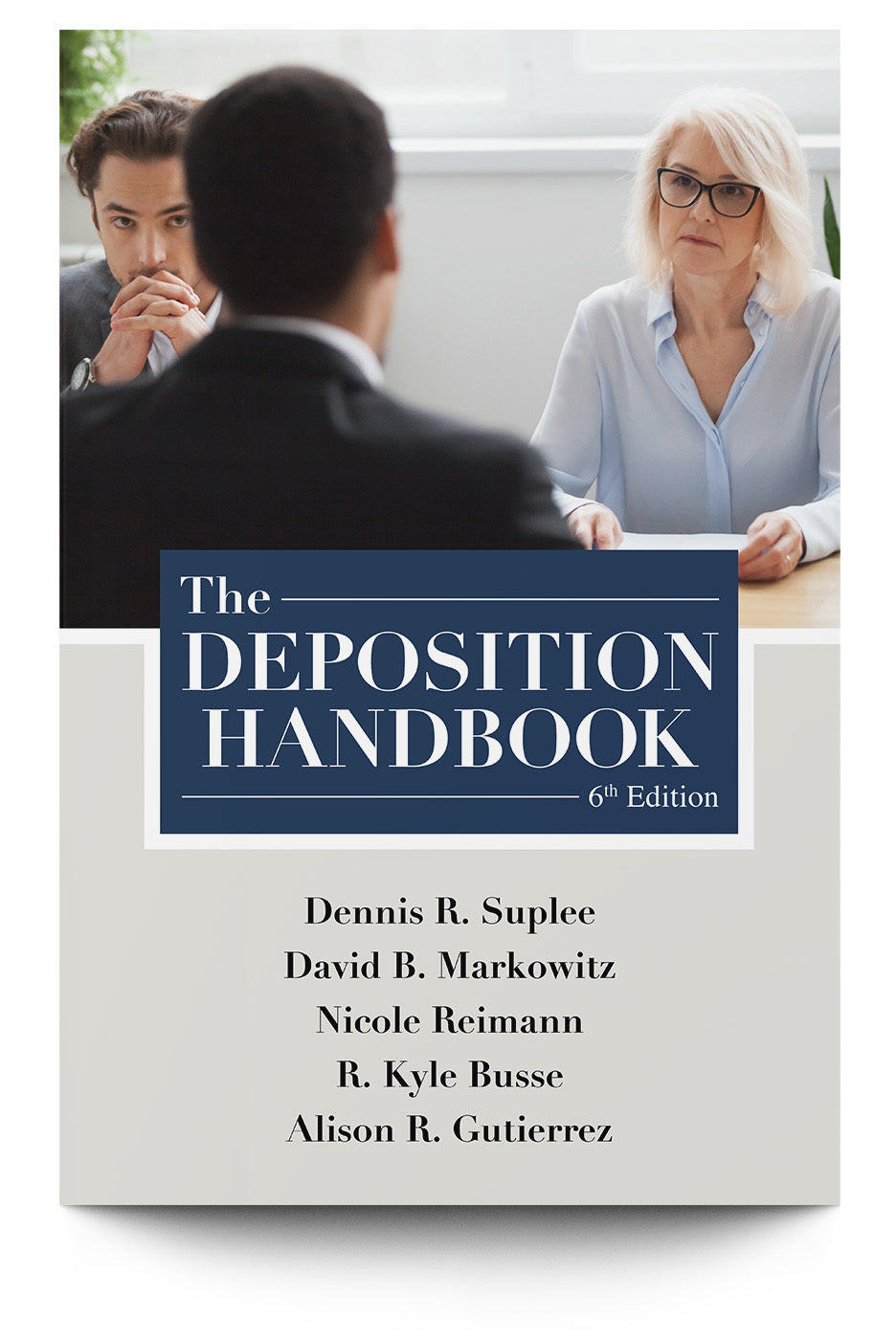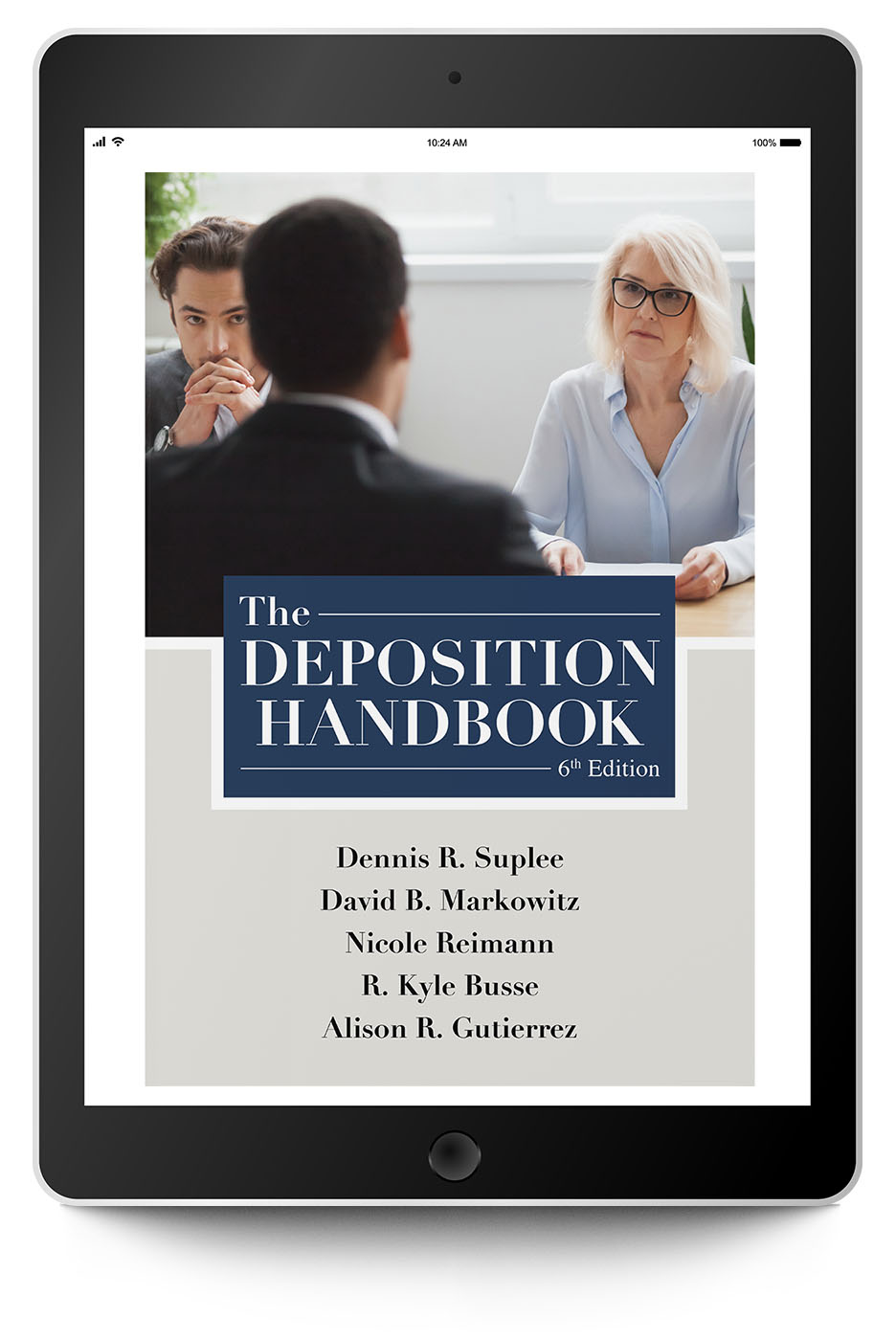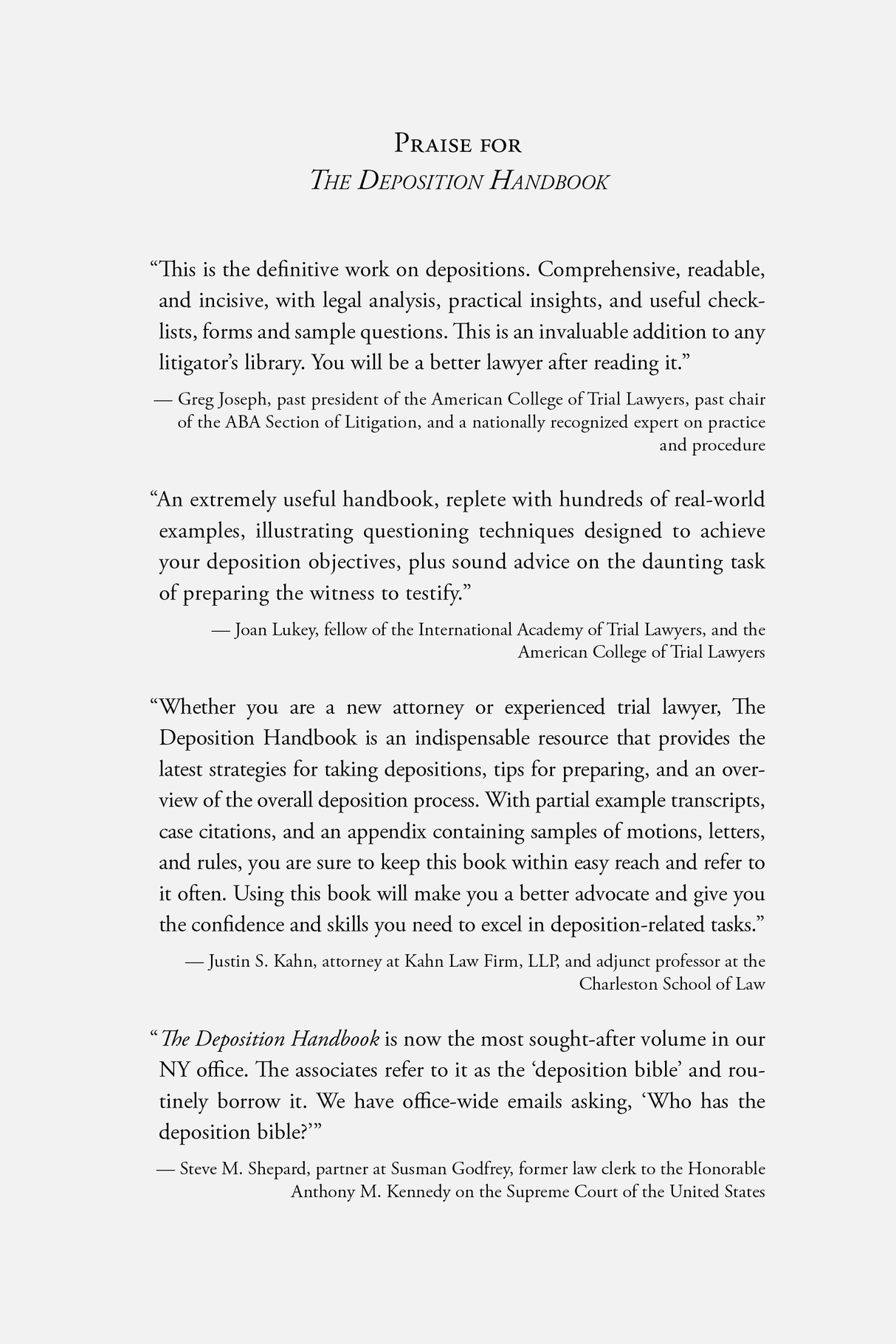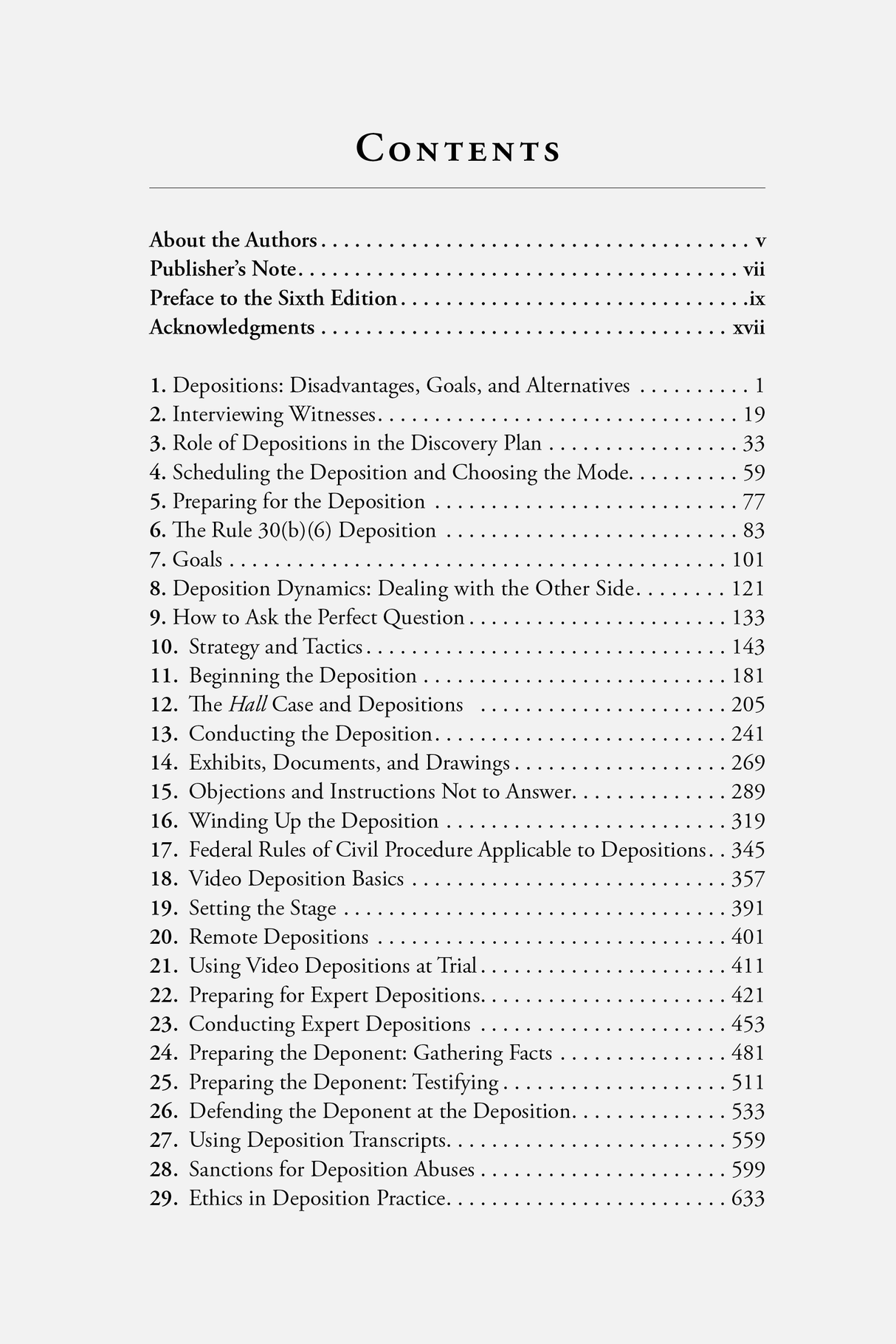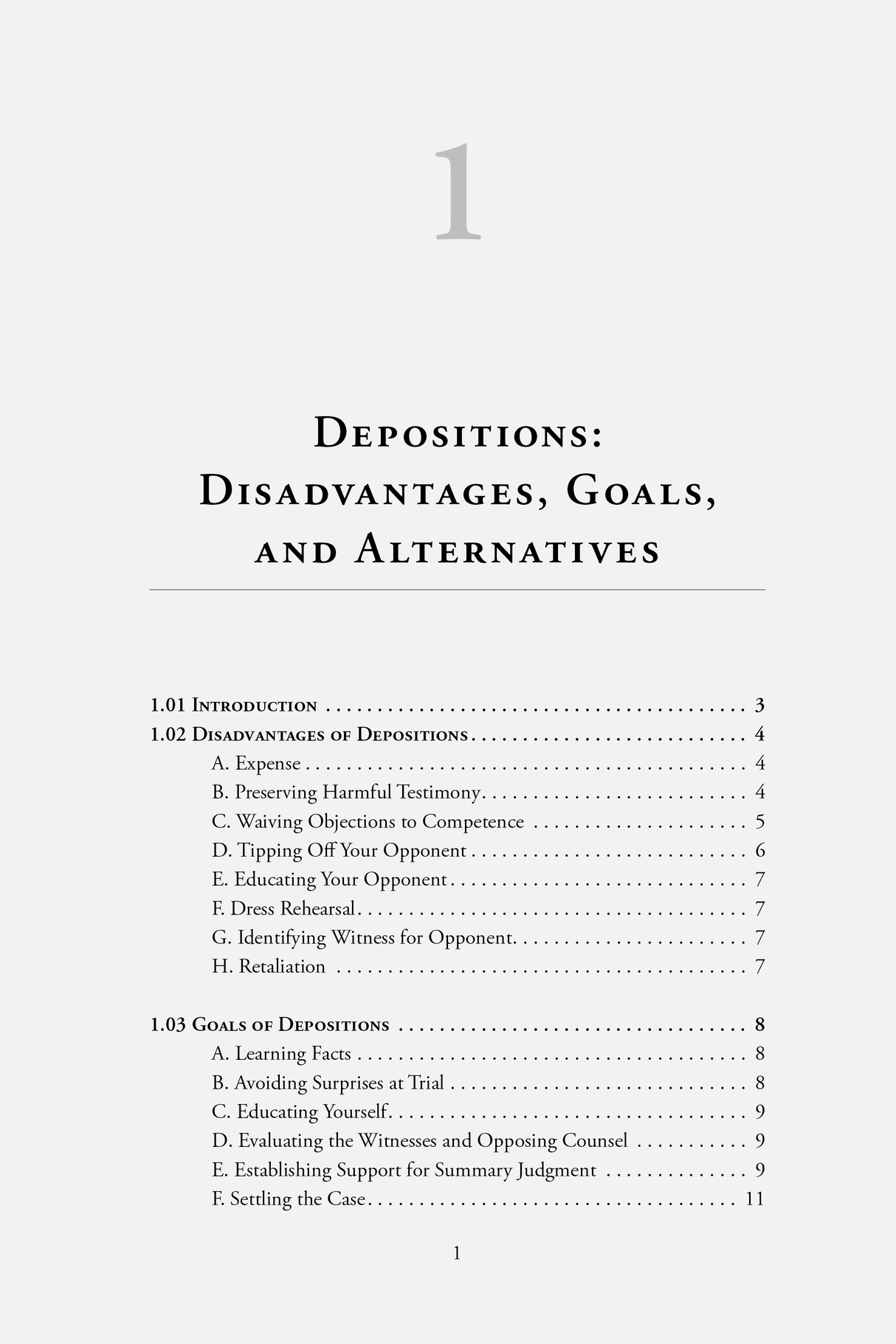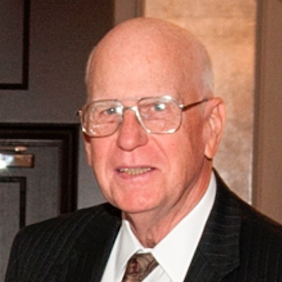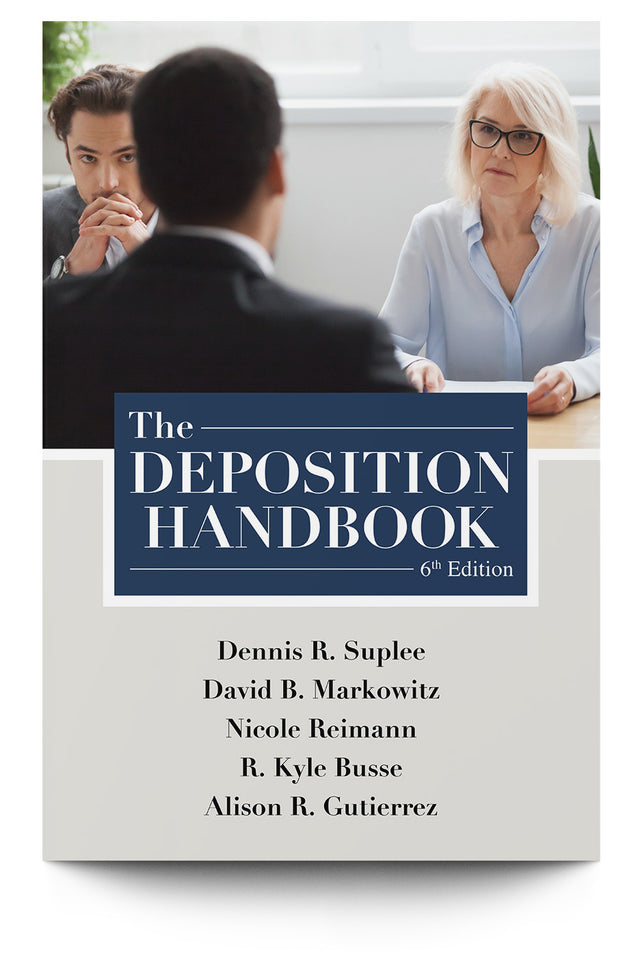Description
Description
Many cases that settle are won or lost in deposition, and even those cases that make it to trial often rely on the testimony gained from deponents. Through its discussion of the various objectives, strategies, tactics, mechanics, and problems in taking depositions, The Deposition Handbook is widely regarded as the definitive text on taking and defending a deposition.
In the newest edition, authors Dennis Suplee and Nicole Reimann have brought in David B. Markowitz, R. Kyle Busse, and Alison R. Gutierrez to add insights from their own practices as well as the deposition experiences of lawyers from their firms, professional colleagues, and even adversaries, to bring additional insights, strategies, and practical examples covering a huge range of topics as well as significant developments in case law and rule changes.
Not only do the authors walk beginning attorneys through the nuts and bolts of how to approach and take a deposition (including how to successfully prepare and defend a client), but they also delve into many of the deeper and more nuanced issues experienced trial lawyers face in more complicated cases. Some of the more notable updates include:
- A free-standing chapter written by David Markowitz on effective deposition questioning
- An expanded discussion of remote depositions and the changes adopted since COVID-19
- An analysis of the first change to Rule 30(b)(6) in fifty years
- A more current and expanded discussion of the case law that has developed since Hall v. Clinton Precision
- Whether courts are permitting counsel to play video depositions during their opening statements
- How courts are interpreting the language of Rule 30(e), saying that the deponent can make “changes in form or substance” to their deposition answers, and whether a deponent can change the substance of their deposition testimony after the fact
- A detailed discussion of a so-called sham affidavit–an affidavit contrary to the affiant’s deposition testimony that is submitted in opposition to a motion for summary judgment
- An expanded treatment of the sanctions that may be imposed on lawyers who violate traditional protocols and disrupt the truth-seeking purpose of depositions
- And more
The Deposition Handbook provides specific techniques for eliciting information, guidelines for video depositions, case studies, checklists, numerous examples, rules of conduct, and sample questions you can immediately adopt in your next case. This user-friendly and comprehensive guide offers expert analysis of the strategies and tactics you need to successfully handle your depositions.
You’ll also get examples and detailed discussions covering:
- Whether counsel may interview an adverse party’s current or former employees
- Private conferences between the deponent and counsel during the course of the deposition
- The pros and cons of “the usual stipulations”
- Questioning techniques
- How to effectively prepare your clients and witnesses to testify
- What factors to consider when deciding whether to prepare the witness to do more than just answer the question
Written from the litigator’s perspective, this text delivers insights into how you can obtain case-winning answers from your deponents. If you are looking for a comprehensive desk reference for your office, this book is a treasure of information.
Your eBooks are now accessible from your Trial Guides account! Click here for step by step instructions.
Do you want the eBook and print book? After you complete your purchase of the print book you will receive a coupon code via email to purchase the eBook for $20.
Authors
Authors
Details
Details
Paperback: 770 pages; 6th edition (2023); ISBN: 978-1-951962-58-6
Publisher: Trial Guides, LLC
Table of Contents
Table of Contents
Preface to Sixth Edition
Acknowledgments
- Depositions: Disadvantages, Goals, and Alternatives
- Interviewing Witnesses
- Role of Depositions in the Discovery Plan
- Scheduling the Deposition and Choosing the Mode
- Preparing for the Deposition
- The Rule 30(b)(6) Deposition
- Goals
- Deposition Dynamics: Dealing with the Other Side
- How to Ask the Perfect Question
- Strategy and Tactics
- Beginning the Deposition
- The Hall Case and Depositions
- Conducting the Deposition
- Exhibits, Documents, and Drawings
- Objections and Instructions Not to Answer
- Winding Up the Deposition
- Federal Rules of Civil Procedure Applicable to Depositions
- Video Deposition Basics
- Setting the Stage
- Remote Depositions
- Using Video Depositions at Trial
- Preparing for Expert Depositions
- Conducting Expert Depositions
- Preparing the Deponent: Gathering Facts
- Preparing the Deponent: Testifying
- Defending the Deponent at the Deposition
- Using Deposition Transcripts
- Sanctions for Deposition Abuses
- Ethics in Deposition Practice
Appendices
Index
What Legal Leaders Are Saying
— Greg Joseph, past president of the American College of Trial Lawyers, past chair of the ABA Section of Litigation, and a nationally recognized expert on practice and procedureThis is the definitive work on depositions. Comprehensive, readable, and incisive, with legal analysis, practical insights, and useful checklists, forms and sample questions. This is an invaluable addition to any litigator's library. You will be a better lawyer after reading it.
— Bob Weber, former general counsel for IBM and litigator at Jones DayThis is the book I wish I had written. It is filled with wisdom, practical advice and common sense. And, most rare for a legal text, it is a pleasure to read. It belongs on every litigator’s bookshelf, to be consulted frequently.
— Joan Lukey, fellow of the International Academy of Trial Lawyers, and the American College of Trial LawyersAn extremely useful handbook, replete with hundreds of real-world examples, illustrating questioning techniques designed to achieve your deposition objectives, plus sound advice on the daunting task of preparing the witness to testify.
— Steve M. Shepard, partner at Susman Godfrey, former law clerk to the Honorable Anthony M. Kennedy on the Supreme Court of the United StatesThe Deposition Handbook is now the most sought-after volume in our NY office. The associates refer to it as the “deposition bible” and routinely borrow it. We have office-wide emails asking, “Who has the deposition bible?”

